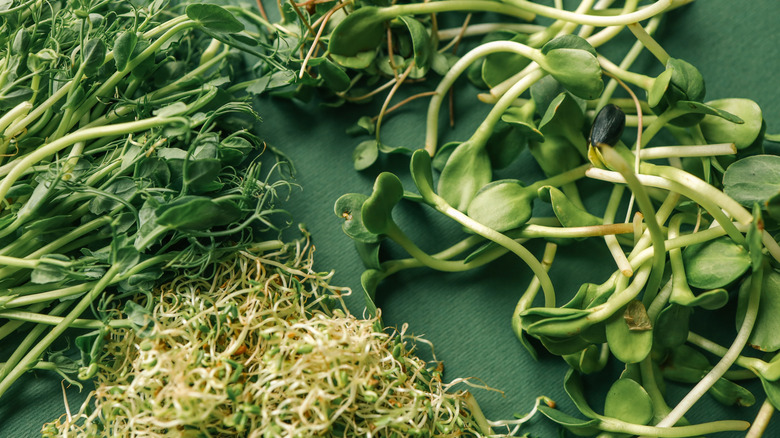The Greens You Should Avoid Adding To Your Make-Ahead Sandwich
Whether you're a meal prepper who meticulously plans a week in advance or you're simply throwing together a sandwich for a trip to the beach, safety is always important when it comes to maintaining the integrity of your make-ahead foods. Generally, that means being mindful of cross-contamination (here's the surefire way to avoid cross-contamination with raw ground beef) and avoiding "danger zone" temperatures, but it also means proper cook times and keeping an eye on expiration dates. Bacteria can grow rapidly in the right environments, so if you're looking to avoid all possible risks when it comes to that made-ahead sandwich, it might be best to skip the sprouts.
They can be delicious and nutritious, but raw sprouts have the potential to harbor a boatload of harmful bacteria. Sprouts have a high likelihood of bacteria due to the conditions in which they grow, which entail heat and humidity, aka foodborne illness's best friends. The risk of foodborne illnesses from raw sprouts is so high that the Food and Drug Administration (FDA) issued a warning about the dangers in 2019, and the Centers for Disease Control has been studying the effects of bacteria on raw sprouts since the '90s. While any food can technically harbor dangerous bacteria, raw sprouts are especially susceptible the longer they're left untouched, so they don't make the best addition to a sandwich that you're going to wait a few hours or days to eat, even at cooler temperatures.
Sprouts can harbor harmful bacteria, which isn't an addition you'd want in your sandwich
The warning about raw sprouts applies to various kinds, everything from alfalfa sprouts and bean sprouts to radish sprouts and wheat sprouts. It's not uncommon to find fresh sprouts on sandwiches, salads, or stir-fries, but the CDC put out a warning that "it's especially important to avoid raw sprouts if you are in a group more likely to get seriously sick from food poisoning," such as "adults aged 65 and older, children younger than age 5, people with weakened immune systems, and pregnant women." The most common types of illnesses associated with raw sprouts include Salmonella and E.Coli, both of which have seen over 50 reported outbreaks linked to raw sprouts between 1997 and 2019, according to the FDA.
Most sprouts that we consume harbor bacteria before they even make it into our hands, sometimes experiencing contamination the moment they're seeded, and sometimes picking it up during harvesting and packaging. That's why we ranked sprouts as one of the 12 foods to avoid when packing make-ahead lunches. There's no singular, most effective way to destroy the potential bacteria hiding on raw sprouts, but it's generally recommended to cook your sprouts before you eat them to minimize that risk. Studies have also shown that submerging the sprout seeds in a chlorine mixture before farmers plant them can help eliminate bacteria, but you could also try washing your already-sprouted seeds in a watered-down bleach mixture to prevent future bacterial growth.

